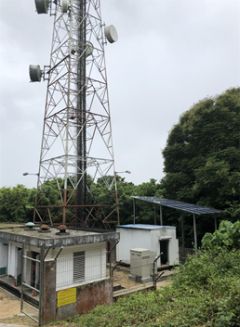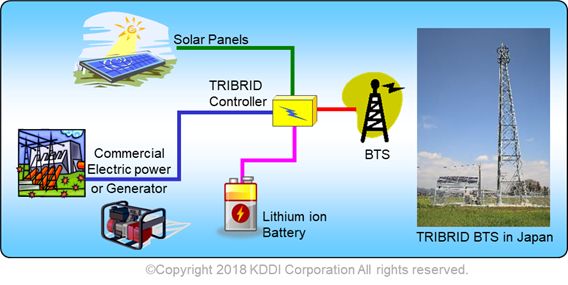|
TRIBRID Project registered as official JCM Project in Indonesia
TRIBRID BTS Systems hope to demonstrate an 80% reduction in base station carbon footprints
JAKARTA, Jul 16, 2018 - (ACN Newswire) - The TRIBRID Project in Indonesia, run by KDDI Corporation and NEDO (New Energy and Industrial Technology Development Organization) of Japan, was registered as a designated project at the 8th Joint Committee on JCM Project Implementation held in Jakarta on July 10 (www.jcm.go.jp/id-jp).
 | | Kalimantan, Indonesia TRIBRID BTS, one of twenty, TRIBRID Project, 2018. | | |
 | | Presentation of TRIBRID System with BTS, twenty for TRIBRID Project, 2018. | | |
The JCM, or Joint Crediting Mechanism, is an initiative of the Japanese Government launched in 2013 to facilitate the funding and diffusion of leading low carbon technologies and related systems across the developing countries (www.gec.jp/jcm/).
With the Project in Indonesia, low carbon TRIBRID Systems were installed at 20 conventional BTS (Base Transceiver Station) sites, with the aim of demonstrating that overall greenhouse gas emissions at the BTS sites could be reduced by up to 80% (www.nedo.go.jp/content/100870080.pdf).
This year marks the 60th Anniversary of Japan-Indonesia Diplomatic Relations (www.60jpid.com), and so the TRIBRID Project has also been designated as an anniversary commemorative project.
TRIBRID BTS Project Details
In Indonesia, BTSs are proliferating rapidly as mobile phones come into widespread use, but many lack access to commercial power service or are subject to severe power outages. Diesel electric power generators installed to ensure stable power supply consume fuel and impact the environment.
TRIBRID Systems make efficient use of power by alternating commercial-use, solar power and late-night battery charging, depending on the time of day and the weather conditions. KDDI built the first TRIBRID System in Japan in December 2009. Since then, the number of TRIBRID Systems in Japan has grown to more than 100.
In Jan 2015, KDDI introduced the TRIBRID System to a BTS to Indonesia, as an initiative of Japan's Ministry of Economy, Trade & Industry (1). By Jan 2018, NEDO had implemented 20 TRIBRID BTSs in Indonesia(2) and was moving ahead with the Demonstration Project. On 10 July 2018, the TRIBRID Project, run by KDDI and NEDO, was approved and registered as an Official Project by the Japan-Indonesia JCM Joint Committee.
The TRIBRID Project involves ensuring the electric load at the TRIBRID BTSs by managing commercial power services, power generated from solar panels, power stored in lithium ion batteries and the power supplied by diesel generators, as set up in Indonesia. While cutting diesel consumption and reducing greenhouse gas emissions, TRIBRID Technology will also make possible to ensure the long-term stability of the telecom ecosystem.
Since all parts of a TRIBRID System are procured within Indonesia, the TRIBRID Project contributes to Indonesia's industrial development. Progress will come in optimizing the TRIBRID System for a wide range of environments, such as tropical rain forest locations through the monsoon season. By conclusion in February 2019, the Project hopes to demonstrate the conservation equivalence of an 80% reduction in greenhouse gas emissions.
NEDO and KDDI will cooperate in future with the Indonesian Ministry of Industry to further diffuse TRIBRID Technology across Indonesia, as it is used in Japan. By converting 5 -10% of the base stations in Indonesia that lack commercial-use power sources or are otherwise susceptible to power supply instability, they aim to improve energy conservation by the equivalent of 70,000 tons of greenhouse gas emissions per year.
To effectively address the issues of climate change and global warming and encourage low-carbon growth around the world, the Government of Japan proposed the JCM (Joint Crediting Mechanism) as a solution, facilitating the spread of leading low carbon technologies, products, systems, services and infrastructure, and contributing to sustainable development in developing countries(3).
1) 'KDDI tackles global warming with international TRIBRID base stations' : http://news.kddi.com/kddi/corporate/english/newsrelease/2015/01/14/885.html
2) 'NEDO Program to Facilitate Private Sector Promotion of Low-carbon Technology Overseas' : http://www.nedo.go.jp/english/other_20161111.html
3) JCM / Joint Credit Mechanism : reducing greenhouse gases, & splitting the benefits between countries: http://gec.jp/jcm/ and https://www.carbon-markets.go.jp/eng/.
Please contact:
Kobayashi, Ishida, Kisanuki
NEDO International Affairs Department
Global Environment Technology Promotion Division
Telephone: +81-44-520-5185
This release is abridged :
http://news.kddi.com/kddi/corporate/english/newsrelease/2018/07/11/3263.html
Source: KDDI Corporation
Sectors: Telecoms, 5G, Electronics, Travel & Tourism, Wireless, Apps, Alternative Energy
Copyright ©2025 ACN Newswire. All rights reserved. A division of Asia Corporate News Network. |